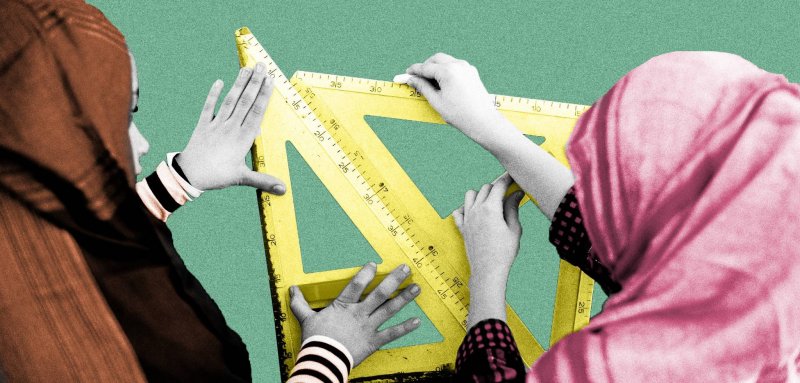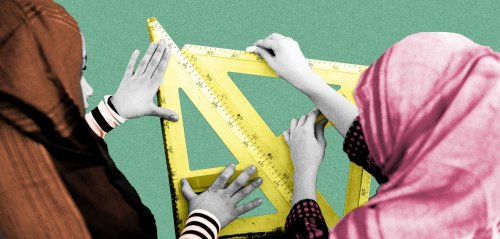“Wear the hijab in school and take it off when you leave if you wish”... This phrase is what one usually hears from staff in the education sector across Egypt, in a bid to force young girls to wear a headscarf in schools.
Some staff members have even reached the extent of persuading students and some parents that the veil is an integral part of the school uniform imposed by the Ministry of Education.
Egyptians are already aware of this old practice. However, online controversy has recently surfaced on social media sites, after several parents began talking about forcing their daughters to wear hijab inside school, even if the girls aren’t wearing them outside the schoolgrounds.
"Wear It In School & Remove It Outside"
With the start of the new school year in late October, social development consultant Lamia Loutfi shared her tale on Facebook of how a teacher forced her youngest daughter Reem to wear hijab.
It did not stop with the use of force and provocation on the young girl to wear a headscarf; instead, the situation went as far as to mock and ridicule the girl’s parents via their Facebook accounts.
Lamia wrote, “My 13-year-old daughter was bullied by 3 teachers at the Belbeis Official Language School, where they taught her 4 important messages: Hijab is a part of the school uniform; wear it in school and take it off outside the school; we won’t let you into school without it; if your mom doesn’t approve it’s not our problem, solve your own problem with your mom.”
She went on to say in her post, “These messages reflect the sad reality we live in within our schools: we lie about the school uniform, gang up on a child to terrify and threaten her, and delude her into thinking she has problems with her own mother,” concluding with, “What great schooling and education.”
This post triggered a mocking and cynical reply from one of the teachers, prompting the mother to file a complaint to the school principal.
“Investigation is still underway over the incident that happened with my daughter Reem,” Lamia Loutfi tells Raseef22. “The teacher I filed a complaint against has been transferred to another school,” she says, pointing out that both the National Council for Women and the National Council for Childhood & Motherhood are closely following the progress of the investigations.
The mother remarked that the incident has a criminal aspect to it, namely the mockery and defamation she was subjected to by the teacher on Facebook, “but I have not taken a stance over filing a legal complaint yet, since, according to the law, it could lead to locking a 50-year-old teacher behind bars.”
She added that what happened to Reem is not an “isolated incident”, as Egypt’s Minister of Education Tarek Shawky put it. Instead, it is a recurring phenomenon, “During the course of my career, I have witnessed many incidents that came close to my daughter’s story, especially in Upper Egypt (Sa'id) and rural villages in the countryside where the veil is dealt with as an essential part of the school uniform.”
They've gone as far as to force Christian girls to wear the headscarf. When they wore a veil bearing illustrations from their own religious belief, the school administration refused and forced them to wear a headscarf free of any faith-based drawings
She also observed on the job numerous complaints made by parents opposing what teachers are doing against their daughters, “They have gone as far as to force Christian girls to wear a headscarf too. When these girls tried to wear a veil bearing illustrations from their own religious belief, the school administration refused and forced them to wear a headscarf free of any faith-based drawings.”
The social consultant explained that this is not the first such occurrence she has gone through. She found herself in the same situation once before when her eldest daughter enrolled in the first year of preparatory school in another region of Egypt’s Sharqia Governorate.
Neither the First Nor The Last
Barely a few days separated Lamia Loufi’s complaint from that of Shayma’ al-Najjar, a resident of Upper Egypt’s Sohag Governorate. Shayma’ posted on her Facebook account about how her daughter was subjected to harassment in order to coerce her into wearing a veil. She wrote: “I do not know what to do or how to act. My daughter is in second grade of preparatory school and refuses to wear a headscarf. Today she was punished at school and they told her she must wear the hijab. I want her to wear it of her own conviction, not from school or parental pressure. The administration says she will not be allowed into the school if she doesn’t wear a headscarf.”
During the past recent years, news and media outlets have reported instances of abuse or violence carried out by teachers against students not wearing a headscarf, sparking public outrage, but to no avail.
In 2012, one of the villages in Luxor Governorate saw a female teacher cutting the hair of two students in front of a joint classroom, because they did not wear a headscarf. In consequence, the Luxor Criminal Court handed out a 6-month suspended prison sentence to the teacher.
Likewise, in 2015, a male teacher from a school in the Faiyum Governorate shaved the head of a female student with a razor for not wearing the hijab. This led the student to suffer from severe mental distress after encountering bulling and harassment.
“I Have Come To Detest Religion”
Forcing girls to wear a headscarf from a young age may have grave psychological side effects that could carry on until an older age, with later occurrences possibly triggering a past traumatizing event from their young school life.
Journalist Fatima Abdullah, 23, recounts to Raseef22, “I live in the village of al-Ayyat in the Giza Governorate. In first grade of preparatory school I was forced to wear hijab by teachers inside the school. They not only convinced us it was a primary part of the school uniform, but also banned us from wearing pants for being too conspicuous. I didn’t want to wear a headscarf, but I could not stop the intimidation and coercion exercised upon us to wear it. I gave in and wore the hijab against my will. This is something that has left a profound impact on my psyche, and I continue to suffer from it even now.”
She adds, “I used to often detest the way my face looked in a headscarf, especially since my father refused to let me wear it only on schoolgrounds, as other families did. He would tell me: ‘It is not right to wear the hijab in school and remove it outside’, and he made me wear it both inside and outside school.”
“I have come to detest religion by force. Enforcing the veil on me has cast a long shadow that turned into something similar to a wall between me and my family, which deals in the same ideals that my old the school did: respect & obedience.”
Abdullah goes on to say, “I hate the teachers who forced me to wear the hijab, and I hate the school that acted as a breeding ground for abuse, intimidation, and coercion into ideas we knew nothing of. Even now I think of taking off my scarf, but I fear my family’s reaction since it could lead to violence. I have come to detest religion by force. Enforcing the veil on me has cast a long shadow that turned into something similar to a wall between me and my family, which deals in the same ideals that my old the school did: respect & obedience.”
“I Still Carry Hatred Within Me”
Aliaa Jamal, 23, has another similar story. To Raseef22, the young lady says, “I grew up in one the villages of the Giza province. In my last year of elementary school, our teachers began forcing us to wear the headscarf - not by guidance or advice, but by bullying and terrorizing us into it. It sometimes got to the extent of involving our parents/guardians.”
The literary studies graduate adds, “Sadly, I heeded by teachers’ instructions to ‘wear the headscarf while at school and take it off when outside.’ But this internalized within me a grudge not only for the hijab, but also for teachers and the school because of the strict body-policing measures they implemented on us.”
The school’s harassment of its students reached the extent of shaming the girls who showed up at its premises without the hijab, making them stand in line for ‘violating the school’s dress code.’
Aliaa concludes, “Although many years passed, and I now wear the hijab out of conviction and acceptance, I still harbor hate for those schools and teachers that forced it upon us and wouldn’t let us live out our childhoods as we pleased.”
Rejected in Islamic Law With Disastrous Psychological Effects
Commenting on these incidents, Dr. Amina Nasir, professor of Islamic philosophy and former dean of the Faculty of Islamic & Arabic Studies at Al-Azhar University's Alexandria branch, described the behavior of those teachers as “completely wrong”, saying that there are absolutely no constituents in Sharia law that call for such behavior.
She points out that if they wanted to direct students to wear the headscarf, then the proper way should be through kind words, guidance, and advice instead of harassment, coercion, and duress, in accordance with the Quranic verse: {(3:159) Thus it is due to mercy from Allah that you deal with them gently, and had you been rough and harsh in heart, they would certainly have dispersed from around you}.
I hate the teachers who forced me to wear the hijab, and I hate the school that acted as a breeding ground for abuse, intimidation, and coercion. I think of taking off my scarf, but I fear my family’s reaction. I have been forced to detest religion
Nasir indicated that the behavior of teachers using coercion regarding the headscarf is repelling students from hijab as well as religion and its teachings.
It is noteworthy to mention that decree No. 113 issued by the Ministry of Education on 17/5/1994 regarding the school uniform specifies in Article 1 how the unified school uniform should be:
“The school uniform for both sexes in primary school: an apron-vest in a color of the educational institute’s choosing. During winter, it is acceptable to wear pantaloons in a uniform color the institute designates. It is also acceptable to substitute the apron-vest with a blouse and skirt of suitable length (for girls) and a blouse and pants (for boys). The winter uniform can be coupled with a pullover or jacket and socks and shoes that suit the designated color.
During middle school, students are required to wear long pants and a blouse. During winter, it is acceptable to wear a pullover or jacket in accordance with the educational institute’s selection, while female students wear a white blouse and an apron-vest of the drill or ‘teal’ fabric with straps in a color of the educational institute’s choosing. The winter uniform can also be made of wool fabric. Female students may wear a pullover or jacket in the color of the apron-vest, which can be replaced with a blouse and skirt of suitable length, as well as socks and shoes that suit the designated color.”
The decree confirms that, at the behest of a written request by a guardian, it is permitted for the student to wear a head covering that doesn’t obscure facial features in a color designated by the educational institute.
Raseef22 is a not for profit entity. Our focus is on quality journalism. Every contribution to the NasRaseef membership goes directly towards journalism production. We stand independent, not accepting corporate sponsorships, sponsored content or political funding.
Support our mission to keep Raseef22 available to all readers by clicking here!
Interested in writing with us? Check our pitch process here!




